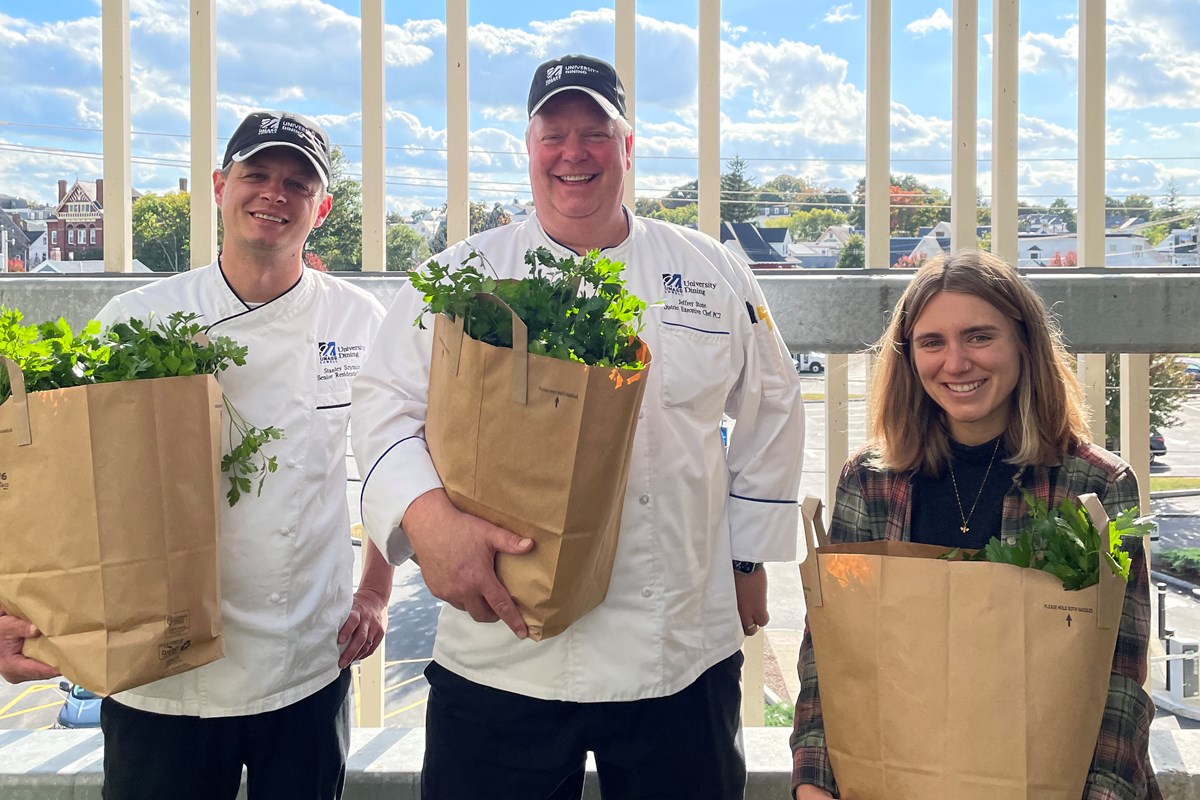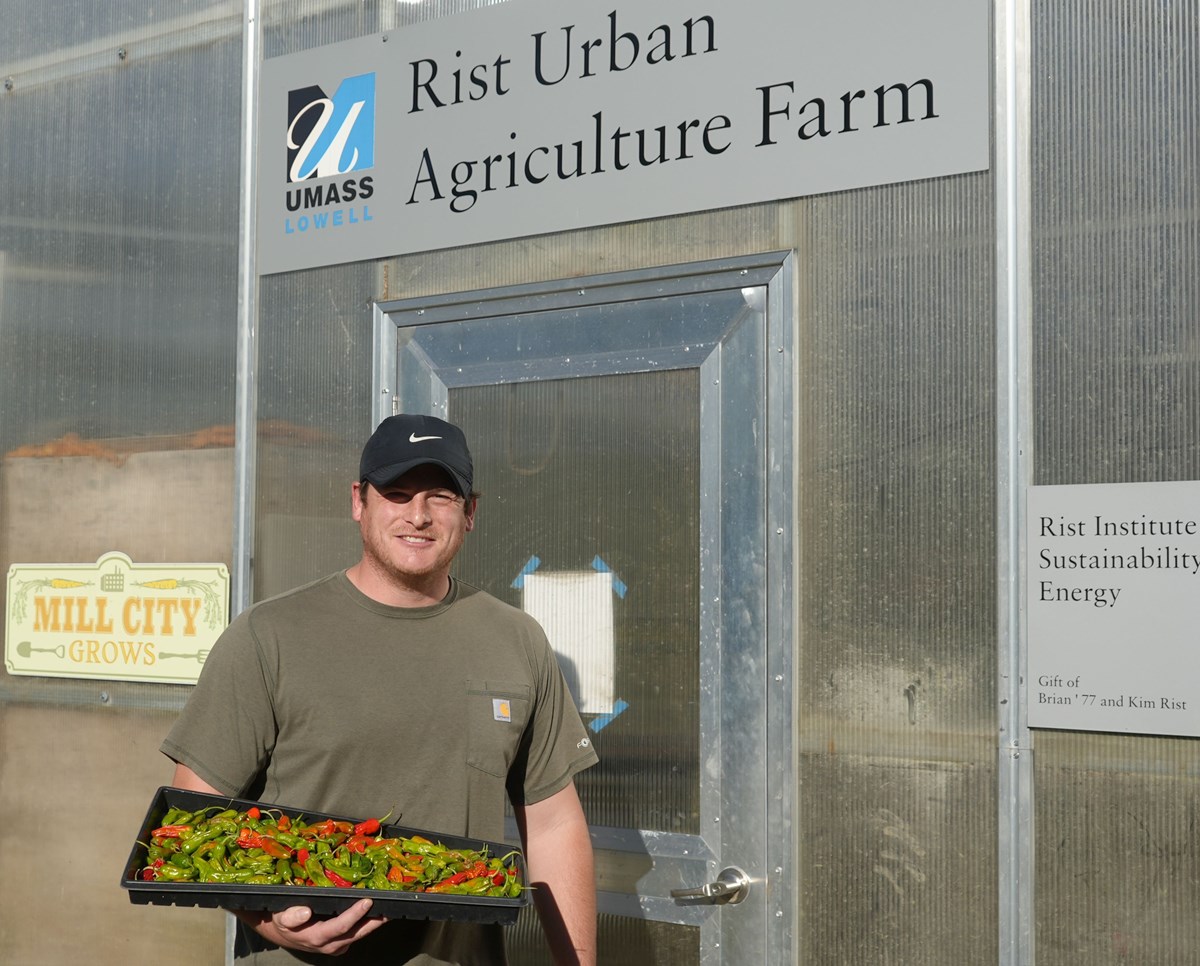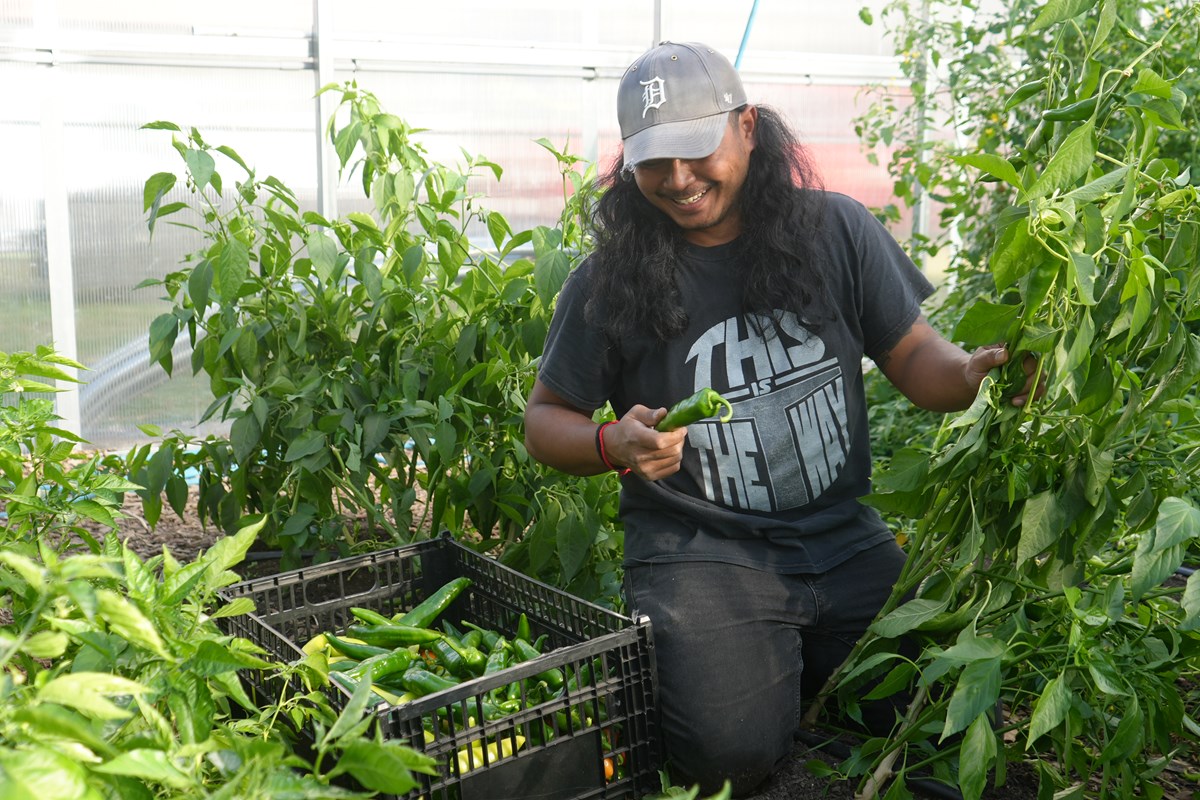University Dining Ramps Up Local Food Options amid Other Sustainability Initiatives
 Image by University Dining
Image by University Dining
11/05/2024
By Brooke Coupal
Chefs at Fox Dining Commons on East Campus spooned creamy mashed potatoes onto plates before placing seared Statler chicken on top. Roasted squash with maple glaze accompanied the dish, which was rounded out with a savory mushroom sauce.
The prior day, Aramark Sustainability Coordinator Annie Conway had made the 10-minute drive from UMass Lowell to Fat Moon Farm in North Chelmsford, Massachusetts, to pick up 10 pounds of mushrooms for the entrée. The squash featured in the meal had been harvested from Plainville Farm in Hadley, Massachusetts.
“My goal is to bring more local food into the dining halls,” says Conway, who started working for Aramark, UMass Lowell’s dining partner, in August. Her position, which is new to the campus, was made possible after UMass Lowell and its partners (Aramark, Mill City Grows, Lowell Public Schools and the Asian American Center for Excellence & Engagement) won a New England Food Vision Prize worth $199,500 from the Henry P. Kendall Foundation. The prize is funding the Lowell Eats Local project, which aims to increase local food purchases at UMass Lowell and change the Greater Lowell food aggregation and distribution systems by coordinating citywide food purchases.
“Annie has truly hit the ground running since she joined UMass Lowell,” says Nicole Kelly, assistant director for UML’s Office of Sustainability. “She has connected hyperlocal growers with Aramark to bring our students a taste of what is being grown on campus and in the surrounding communities.”
Tasty Food with a Local Twist
Tacos with cilantro grown in Lowell. Chimichurri made from parsley harvested from the University Crossing rooftop garden. Pizza sauce featuring cherry tomatoes picked in Londonderry, New Hampshire. These are just a few local food offerings that students have recently enjoyed in the dining halls.
 Image by University Dining
Image by University Dining
Aramark District Executive Chef Jeffrey Stone, who oversees University Dining and University Catering at UMass Lowell, says the Food Vision Prize helped his team ramp up the use of locally sourced food. In October alone, the team saw nearly 3,500 pounds of local produce enter the university kitchens.
“It’s neat to say this all came from across the river or a mile down the road,” Stone says. “We’re getting a better product that’s local.”
More than 40% of that produce came from Horne Family Farms, which was founded by economics alum Chris Horne ’14 in 2018.
“I’ve delivered a nice mix of all sorts of stuff, from lettuce and tomatoes to bok choy and kohlrabi,” says Horne, who partnered with University Dining after learning about the opportunity from Dai Kim, co-executive director of the Lowell-based nonprofit Mill City Grows, which has also supplied produce to the campus.
 Image by Brooke Coupal
Image by Brooke Coupal
Horne, who started delivering produce to UMass Lowell in June, grows his crops in Londonderry, New Hampshire, Mill City Grows’ Big Farm in Lowell and the Rist Urban Agriculture Greenhouse and Farm on East Campus.
“Sometimes, I would harvest at the greenhouse and walk them right over to Fox Hall,” he says. “This is just the beginning of what’s possible.”
Conway recruited the Boston Food Hub, a nonprofit food distributor that has connected UMass Lowell with nearly two dozen farms in Massachusetts.
“That has been really great, because it is an easy and direct way to bring in local produce while also supporting farmers in the area,” she says.
 Image by Brooke Coupal
Image by Brooke Coupal
“Lately, I’ve been trying to include more vegetables and fruits in my diet, so it’s good to know that it’s coming here locally,” said Ruthsmarie Ogando, a first-year nursing student, as she perused the food options at the South Campus Dining Commons in McGauvran Center.
Sustainability Forward
UMass Lowell is already the highest-rated campus in Massachusetts for sustainability, according to the Association for the Advancement of Sustainability in Higher Education. And this local food initiative is taking things to another level.
By purchasing locally, Conway says, UMass Lowell is decreasing its carbon footprint, because the produce does not have to travel as far to get to campus. The university is also stimulating the area’s economy by supporting local farmers.
UML Dining Dietitian Melissa Quirk adds that “getting the freshest produce maximizes its nutrient composition, because there is less time for those nutrients to degrade between harvest and consumption.”
 Image by University Dining
Image by University Dining
Aramark is introducing the campus community to plant-based foods, which have lower greenhouse gas emissions than animal-based foods. The chefs made tacos with mushrooms from Fat Moon Farm for Welcome Day and Open House. In September, Conway handed out vegan ice cream from New City Microcreamery in Hudson, Massachusetts, to students on South Campus.
Most recently, Conway hosted a “Weigh the Waste” event at the university dining halls, where students emptied the food left on their plates into a bin to track how much was wasted. Erica Pen, a first-year business administration student, volunteered to help collect the food waste at Fox Dining Commons.
 Image by Brooke Coupal
Image by Brooke Coupal
“Dining hall events can highlight the impact of food waste, showing students methods to minimize waste like proper portioning, composting and recycling,” she says. “It’s a practical way for students and faculty to learn about sustainability in a setting they frequently visit to reduce our environmental impact.”
Conway plans to organize more events that engage students with sustainability while bringing more local food to campus.
“It’s a point of pride for students to be able to say, ‘My dining hall brings in local food,’” she says. “Students deserve to eat healthy, good food.”
